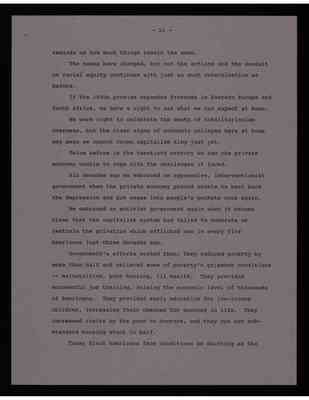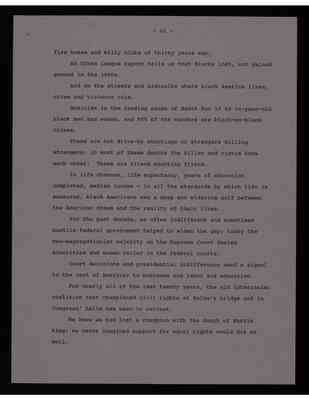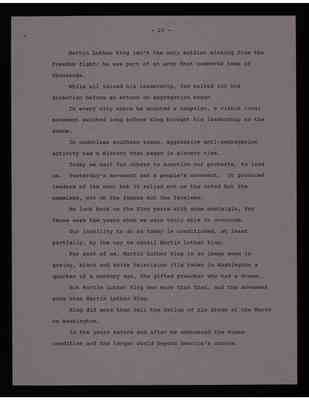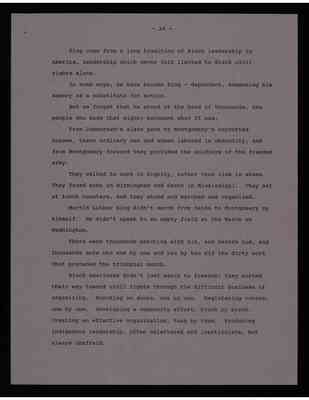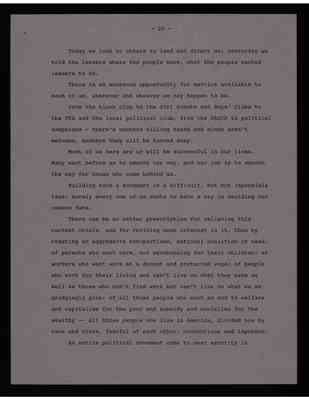Pages
21
reminds us how much things remain the same.
The names have changed, but not the actions and the assault on racial equity continues with just as much determination as before.
If the 1990s promise expanded freedoms in Eastern Europe and South Africa, we have a right to ask what we can expect at home.
We were right to celebrate the death of totalitarianism overseas, but the clear signs of economic collapse here at home may mean we cannot crown capitalism king just yet.
Twice before in the twentieth century we saw the private economy unable to cope with the challenges it faced.
Six decades ago we embraced an aggressive, interventionist government when the private economy proved unable to beat back the depression and put wages into people's pockets once again.
We embraced an activist government again when it became clear that the capitalist system had failed to moderate or restrain the privation which afflicted one in every five Americans just three decades ago.
Government's efforts worked then; they reduced poverty by more than half and relieved some of poverty's grimmest conditions --malnutrition, poor housing, ill health. They provided successful job training, raising the economic level of thousands of Americans. They provided early education for low-income children, increasing their chances for success in life. They increased visits by the poor to doctors, and they cut our substandard housing stock in half.
Today Black Americans face conditions as daunting as the
22
fire hoses and billy clubs of thirty years ago.
An Urban League report tells us that Blacks lost, not gained ground in the 1980s.
And on the streets and sidewalks where black America lives, crime and violence rule.
Homicide is the leading cause of death for 15 to 34-year-old black men and women, and 95% of the murders are black-on-black crimes.
These are not drive-by shootings or strangers killing strangers; in most of these deaths the killer and victim knew each other. These are friend shooting friend.
In life chances, life expectancy, years of education completed, median income - in all the standards by which life is measured, black Americans see a deep and widening gulf between the American dream and the reality of their lives.
For the past decade, an often indifferent and sometimes hostile federal government helped to widen the gap; today the neo-segregationist majority on the Supreme Court denies minorities and women relief in the federal courts.
Court decisions and presidential indifference send a signal to the rest of America; to business and labor and education.
For nearly all of the last twenty years, the old interracial coalition that championed civil rights at Selma's bridge and in Congress' halls has been in retreat.
We knew we had lost a champion with the death of Martin King; we never imagined support for equal rights would die as well.
23
Martin Luther King isn't the only soldier missing from the freedom fight; he was part of an army that numbered tens of thousands.
While all valued his leadership, few waited for his direction before an attack on segregation began.
In every city where he mounted a campaign, a viable local movement existed long before King brought his leadership to the scene.
In countless southern towns, aggressive anti-segregation activity had a History that began in slavery time.
Today we wait for others to sanction our protests, to lead us. Yesterday's movement was a people's movement. It produced leaders of its own; but it relied not on the noted but the nameless, not on the famous but the faceless.
We look back on the King years with some nostalgia, for those were the years when we were truly able to overcome.
Our inability to do so today is conditioned, at least partially, by the way we recall Martin Luther King.
For most of us, Martin Luther King is an image seen in grainy, black and white television film taken in Washington a quarter of a century ago, the gifted preacher who had a dream.
But Martin Luther King was more than that, and the movement more than Martin Luther King.
King did more than tell the nation of his dreams at the March on Washington.
In the years before and after he addressed the human condition and the larger world beyond America's shores.
24
King came from a long tradition of Black leadership in America, leadership which never felt limited to Black civil rights alone.
In some ways, we have become King - dependent, summoning his memory as a substitute for action.
But we forget that he stood at the head of thousands, the people who made that mighty movement what it was.
From Jamestown's slave pens to Montgomery's boycotted busses, these ordinary men and women labored in obscurity, and from Montgomery forward they provided the soldiers of the freedom army.
They walked to work in dignity, rather than ride in shame. They faced mobs in Birmingham and death in Mississippi. They sat at lunch counters, and they stood and marched and organized.
Martin Luther King didn't march from Selma to Montgomery by himself. He didn't speak to an empty field at the March on Washington.
There were thousands marching with him, and before him, and thousands more who one by one and two by two did the dirty work that preceded the triumphal march.
Black Americans didn't just march to freedom; they worked their way toward civil rights through the difficult business of organizing. Knocking on doors, one by one. Registering voters, one by one. Developing a community effort, block by block. Creating an effective organization, town by town. Producing indigenous leadership, often unlettered and inarticulate, but always unafraid.
25
Today we look to others to lead and direct us; yesterday we told the leaders where the people were, what the people wanted leaders to do.
There is an enormous opportunity for service available to each of us, wherever and whoever we may happen to be.
From the block club to the Girl Scouts and Boys' Clubs to the PTA and the local political club, from the NAACP to political campaigns - there's nowhere willing hands and minds aren't welcome, nowhere they will be turned away.
Most of us here are or will be successful in our lives. Many went before us to smooth our way, and our job is to smooth the way for those who come behind us.
Building such a movement is a difficult, but not impossible task; surely every one of us wants to have a say in deciding our common fate.
There can be no better prescription for relieving this current crisis, and for reviving some interest in it, than by creating an aggressive non-partisan, national coalition of need, of parents who want care, not warehousing for their children; of workers who want work at a decent and protected wage; of people who work for their living and can't find work but can't live on what we so grudgingly give; of all those people who want an end to welfare and capitalism for the poor and subsidy and socialism for the wealthy -- all those people now live in America, divided now by race and class, fearful of each other, contentious and impotent.
An entire political movement came to near maturity in
